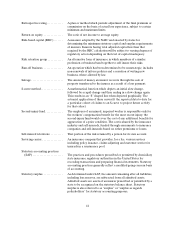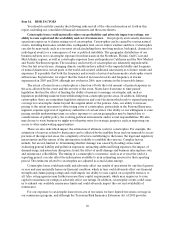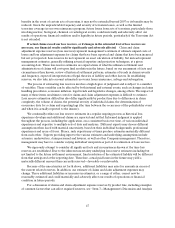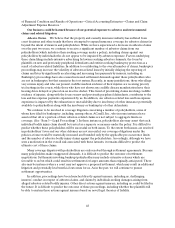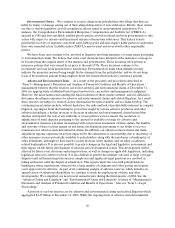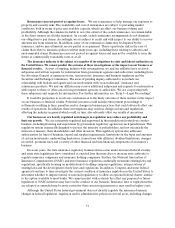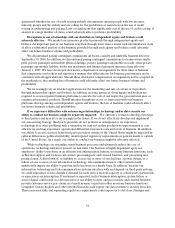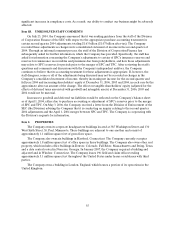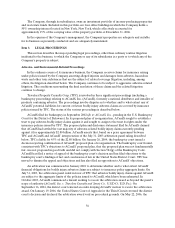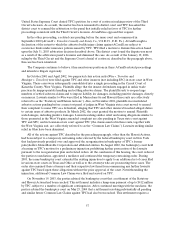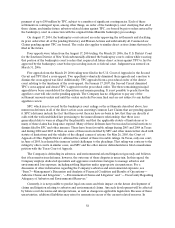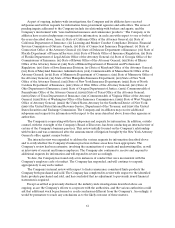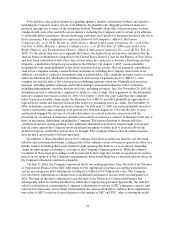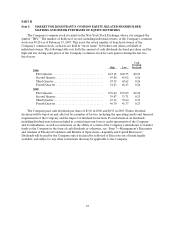Travelers 2006 Annual Report Download - page 66
Download and view the complete annual report
Please find page 66 of the 2006 Travelers annual report below. You can navigate through the pages in the report by either clicking on the pages listed below, or by using the keyword search tool below to find specific information within the annual report.54
questioned whether the use of credit scoring unfairly discriminates against people with low incomes,
minority groups and the elderly and are calling for the prohibition or restriction on the use of credit
scoring in underwriting and pricing. Laws or regulations that significantly curtail the use of credit scoring, if
enacted in a large number of states, could adversely affect our futureprofitability.
Disruptions to ourrelationships with our distributors, independent agents and brokers could
adversely affect us. We market our insurance products primarily through independent agents and
brokers. An important part of our business is written through fewer than a dozen such intermediaries. Loss
of all or a substantial portion of the business provided through such agents and brokers could adversely
affect our future business volume and profitability.
We discontinuedpaying contingent commissions onexcess casualty and umbrella business effective
September 30, 2006. In addition, we discontinuedpaying contingent commissions for homeowners multi-
peril, private passenger automobile physical damage, private passenger automobile no-fault, other private
passenger automobile liability, boiler and machinery and financial guaranty insurance lines effective
January 1, 2007. We have developed alternative compensation arrangements for these lines of business
that compensate our brokers and agents in a manner that differentiates for business performance and is
consistent with all applicable laws. Should these alternative compensation arrangements not be accepted in
the marketplace, the resulting loss of business could adversely affect our future business volume and
profitability.
We increasingly rely on internet applications for the marketing and sale of certainof its products
through independent agents and brokers. In addition, in some instances, those agents and brokers are
required to access separate business platforms to execute the sale of our respective personal insurance or
commercial insurance products. Should internet disruptions occur, or frustration with our business
platforms develop among our independent agents and brokers, the loss of business could adversely affect
our future business volume and profitability.
If we experience difficulties with outsourcing relationships, technology and/or data security our
ability to conduct our business might be negatively impacted. We outsource certain technology functions
to third parties and may do so increasingly in the future. If we do not effectively develop and implement
our outsourcing strategy, third party providers do not perform as anticipated or we experience
technological or other problems with a transition, we may not realize productivity improvements or cost
efficiencies and may experience operational difficulties, increased costs and a loss of business. In addition,
our ability to receive services from third party providers outside of the United States might be impacted by
cultural differences, political instability, unanticipated regulatory requirements or policies inside or outside
of the United States. As a result, our ability to conduct our business might be adversely affected.
While technology can streamline many business processes and ultimately reduce the cost of
operations, technology initiatives present certain risks. Our business is highly dependent upon our
employees’ ability to perform, in an efficientand uninterrupted fashion, necessary business functions, such
as Internet support and 24-hour call centers, processing new and renewal business, and processing and
paying claims. A shut-down of, or inability to, access one or more of our facilities, a power outage, or a
failure of one or more of our information technology, telecommunications or other systems could
significantly impair our ability to perform such functions on a timely basis. In addition, because our
information technology and telecommunications systems interface with and depend on third-party systems,
we could experience service denials if demand for such service exceeds capacity or a third-party system fails
or experiences an interruption. If sustained or repeated, such a business interruption, system failure or
service denial could result in a deterioration of our ability to write and process new and renewal business,
provide customer service, pay claims in a timely manner or perform other necessary business functions.
Computer viruses, hackers and other external hazards could expose our data systems to security breaches.
These increased risks and expanding regulatory requirements could expose us to data loss, damages and


